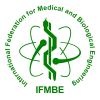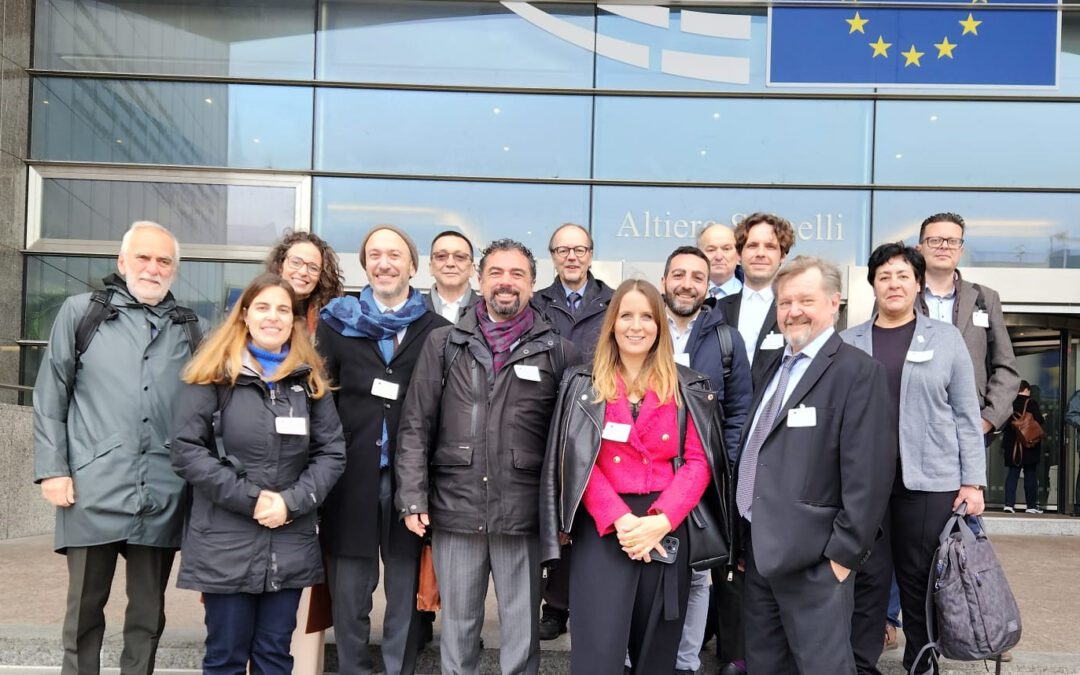Prof. Leandro Pecchia, IFMBE Secretary General, Chair of the EAMBES Political Affairs Working Group (PAWG), and former EAMBES President, successfully organized and delivered a pivotal EPIG event titled Strategic Autonomy and Competitiveness of the EU MedTech Sector – The Role of Biomedical Engineering in Strengthening Europe’s Leadership. IFMBE’s President, Prof. Ratko Magjarevic, also attended the event.
The event took place on March 25, 2025, at the European Parliament and was hosted by MEP Nicolas Gonzalez Casares (S&D, Spain) and MEP Laurent Castillo (EPP, France). The full agenda of the event is available [here].
Key Announcements and Discussions: Laurent Castillo, representing the Ministry of Health, alongside Olivér Várhelyi, announced that the ministry plans to propose revisions to the Medical Device Regulation (MDR) before the end of the year. These revisions aim to address existing regulatory bottlenecks, ensuring that Europe remains at the forefront of medical technology innovation. Given their expertise, biomedical engineers (BME) are expected to play a crucial role in shaping these regulatory updates.
One of the primary focuses of the upcoming revisions is adapting to the rapid evolution of medical devices. Currently, over two million different medical technologies are available globally, demonstrating the industry’s fast-paced innovation. In Europe, a new patent for medical technology is filed every 30 minutes at the European Patent Office (EPO). With approximately 37,000 companies operating in the sector —90% of which are small and medium-sized enterprises (SMEs)— the medical technology industry is a major driver of employment and innovation, supporting around 880,000 jobs across the continent.
Adapting Regulations to Meet Future Challenges: As medical technology advances rapidly, regulatory frameworks must remain flexible and responsive. Sustainability is also becoming a key priority, particularly regarding single-use medical devices, packaging, and recycling, as the healthcare sector seeks to minimize its environmental impact. At the same time, ensuring the availability and competitiveness of medical devices in the European market remains essential, reinforcing the region’s global leadership in medical innovation. Despite these evolving priorities, patient safety remains paramount, guiding all regulatory adjustments and technological developments.
One of the major challenges in implementing the revised MDR is managing legacy medical devices. The regulatory landscape remains a “moving target,” as older medical technologies developed before current regulations require compliance adjustments. Addressing these challenges will ensure a smooth transition to a more efficient and innovation-friendly regulatory framework.
The Role of Digital Transformation in Healthcare: Another key area of transformation is the increasing role of digital technology in healthcare. The European Health Data Space (EHDS) is a critical initiative designed to unlock the potential of health data for both primary and secondary applications. Primary applications include patient care and electronic health records (EHR), while secondary applications focus on research and innovation. Stakeholders are encouraged to consult the EU catalog of EHDS, which serves as a valuable reference for navigating this evolving digital ecosystem.
EHDS is also expected to drive further advancements in Artificial Intelligence (AI) in healthcare. However, AI-driven medical technologies present new regulatory and ethical challenges. Recent legislative developments, such as the EU AI Act and the updated Product Liability Directive, provide new guidelines on AI implementation in healthcare. While AI systems must comply with existing MDR provisions, they also face additional requirements, including responsible data governance, accuracy, and human oversight to mitigate bias and ensure reliability.
A Long Tradition of Medical Innovation: The transformation of healthcare through medical devices is part of a long history of technological progress led by biomedical engineers. From the invention of the stethoscope in the 19th century to the development of X-ray machines, medical innovations have continuously revolutionized patient care. Today, personalized medicine and AI-driven technologies are shaping the future of healthcare, promising more precise and effective treatments.
As the saying goes, “No health, no wealth; no medical technologies, no healthcare.” This statement highlights medical devices’ indispensable role in individual well-being and economic prosperity.
Ensuring Europe’s Leadership in MedTech: Maintaining Europe’s competitiveness in the rapidly evolving MedTech sector is vital—not only for economic growth but also for the future of public health. With the ongoing regulatory updates and increased focus on sustainability, digital transformation, and innovation, Europe is poised to strengthen its leadership in medical technology, ensuring a healthier and more prosperous future for all.

